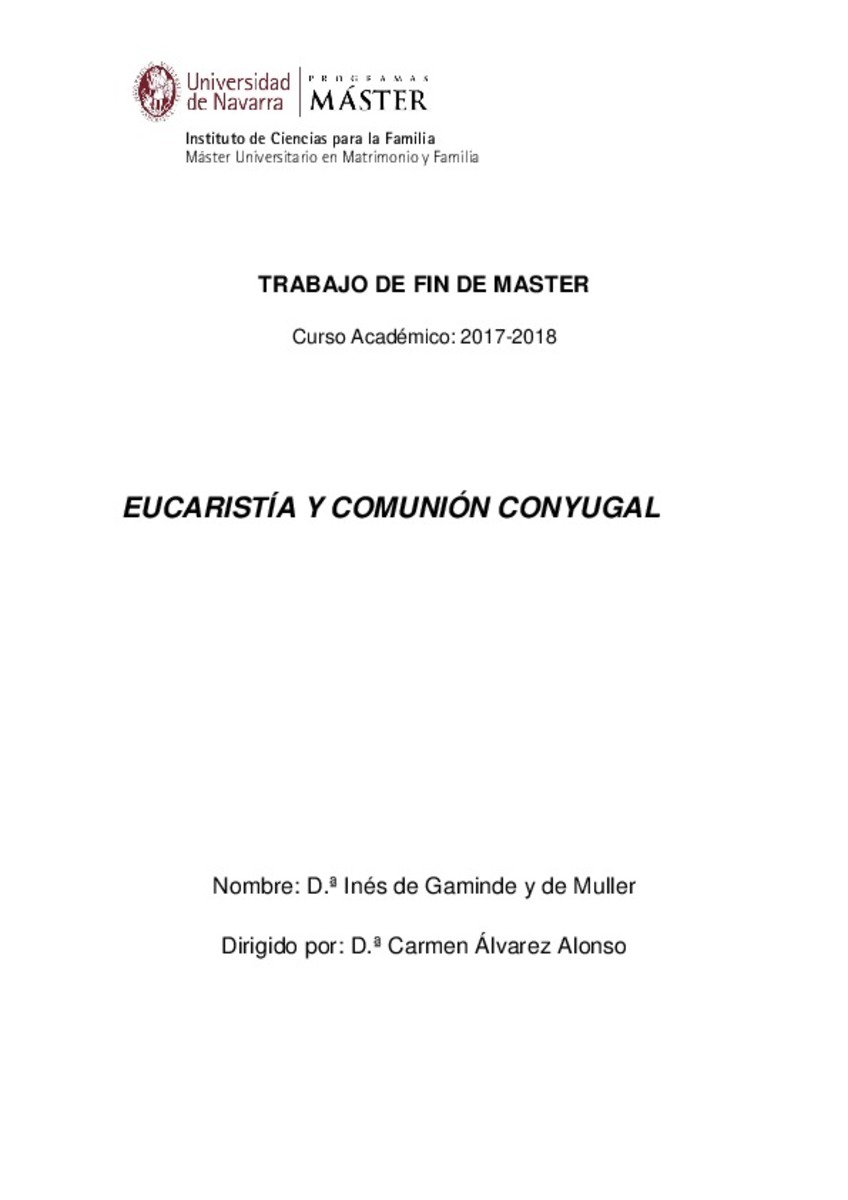Full metadata record
| DC Field | Value | Language |
|---|---|---|
| dc.contributor.advisor | Alvarez-Alonso, C. (Carmen) | - |
| dc.creator | Gaminde-y-de-Muller, I. (Inés) de | - |
| dc.date.accessioned | 2019-09-24T07:16:17Z | - |
| dc.date.available | 2019-09-24T07:16:17Z | - |
| dc.date.issued | 2018-08 | - |
| dc.date.submitted | 2018-08 | - |
| dc.identifier.citation | De Gaminde, I. Eucaristia y Comunión conyugal (Trabajo Fin de Máster). Universidad de Navarra, Pamplona | es_ES |
| dc.identifier.uri | https://hdl.handle.net/10171/58107 | - |
| dc.description.abstract | Entre el 5 de septiembre de 1979 y el 28 de noviembre de 1984, durante las audiencias de los miércoles, Juan Pablo II desarrolla y lleva a cabo las catequesis sobre la Teología del Cuerpo, que tratan del amor humano en el plan divino, la redención del cuerpo y la sacramentalidad del matrimonio. Basadas en la revelación divina y en los primeros capítulos del Génesis, profundiza en el misterio del hombre al principio de la creación, para, desde una antropología adecuada, alcanzar verdaderamente su identidad y vocación. Ello nos lleva a la conclusión de la vocación al amor de todo ser humano como varón o mujer, al ser creado por amor y para amar, a través de un cuerpo esponsal, para vivir en comunión de personas. A lo largo de estos tres capítulos comprenderemos mejor los sacramentos del Matrimonio y la Eucaristía, así como su íntima conexión a través de la entrega del cuerpo. Dios nos crea corpóreos y nuestro cuerpo nos dice muchas cosas sobre el misterio del hombre, del amor humano y de Dios que es Trinidad de Personas en la unidad del Padre, el Hijo y el Espíritu Santo. | es_ES |
| dc.description.abstract | From the 5th of September 1979 to the 28th of November 1984, throughout the Wednesday Audiences, Pope John Paul II develops and imparts the Catechesis on the Theology of the Body, which delves on human love in God’s plans, as well as the redemption of the body and the sacramental nature of marriage. Based on the revelations found in the first chapters of the Book of Genesis, it delves in the mystery of human being at the beginning of creation, so from a correct anthropology, to reach his/her true identity and calling. This leads us to the conclusion that every human being has a call to love; whether man or woman we are made through love and to love with a esponsal body to live in communion with others. Throughout this three chapters we will get a better understanding of the sacrament of holy matrimony and the Eucharist as well as its close connexion through the giving away of the body. God creates us with a “body” and our bodies tell us a lot of things about the mystery of man, of human love and of God who is Trinity in the union of the Father, the Son and the Holy Spirit. | es_ES |
| dc.language.iso | spa | es_ES |
| dc.rights | info:eu-repo/semantics/openAccess | es_ES |
| dc.subject | Eucaristía | es_ES |
| dc.subject | Matrimonio | es_ES |
| dc.subject | Comunión | es_ES |
| dc.subject | Alianza | es_ES |
| dc.subject | Misterio | es_ES |
| dc.subject | Teología del cuerpo | es_ES |
| dc.title | Eucaristia y Comunión conyugal | es_ES |
| dc.type | info:eu-repo/semantics/masterThesis | es_ES |
Files in This Item:
Statistics and impact
Items in Dadun are protected by copyright, with all rights reserved, unless otherwise indicated.






